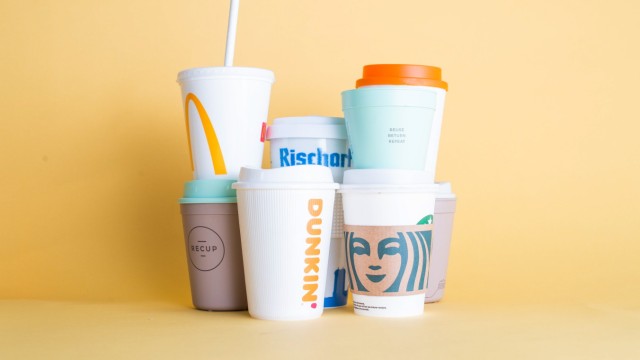Sven Boomgaarden always looks at perplexed faces, it’s part of his job. “Reusable cups?” asks the café employee, “we only have paper cups here,” and holds one up in the air. Boomgaarden then calmly explains that anyone who offers coffee to go must offer a reusable alternative. There are only exceptions for small businesses. The woman behind the counter says she doesn’t know anything about it, but she’ll let her boss know. Boomgaarden puts his business card on the counter, which says “Lower Waste Authority Stuttgart” on it, and leaves the café with a friendly greeting.
Boomgaarden experiences these violations again and again. And this despite the fact that the reusable offer requirement has been in effect since the beginning of 2023. Wherever meals or drinks are sold “to go” in disposable cups or in plastic packaging, i.e. in restaurants, cafes, snack bars, gas stations or some supermarkets, reusable containers must be available as an alternative and advertised on clearly legible signs.
“Restaurants and retailers are literally boycotting the law.”
The federal government wants to limit the huge mountains of waste that disposable packaging causes. But after a year the results are sobering. WWF environmentalists calculated that 14.8 billion drinks and meals were sold “to go” in Germany last year, only 1.6 percent of them in reusable containers. Since the law came into effect, the reusable rate has increased by less than one percentage point. Why is it that hardly anything is progressing? Depends on who you ask.
“Gastronomers and retailers are literally boycotting the law and making it difficult or impossible for consumers to use reusable food,” says Thomas Fischer from the German Environmental Aid DUH. “We all have an interest in reducing waste,” says Ingrid Hartges from the Dehoga hotel and restaurant association. “However, implementing the reusable offer requirement is expensive and time-consuming. Practical solutions are needed.” The regulations are not consistently implemented, we hear from the reusable manufacturer Recup. There are few to no controls.
Sven Boomgaarden checks in Stuttgart whether cafés and bakeries also offer reusable cups.
(Photo: Tobias Bug)
Control of the law is the responsibility of cities and municipalities. To this day it is not clear everywhere who should take over. This means that in many places no one does it. In Stuttgart, the Lower Waste Law Authority controls: Sven Boomgaarden and two of his colleagues have visited 82 companies since last summer, and they found violations in more than half of them. In total, there are almost 2,000 companies in Stuttgart that are subject to the reusable offer requirement.
Some operators freak out when checking
The three officers can’t keep up with the checks. In the morning, Boomgaarden was out on a forest property where someone had illegally dumped rubble. There was still dirt stuck to his shoes when he set out in the afternoon to check the reusable offer requirement in southeastern Stuttgart. Boomgaarden has only been doing the job for nine months; he says he loves making his hometown “a little more beautiful every day.” He looks for his targets along a long main street. He visits two bakeries, an organic supermarket and a gas station, immediately finds the reference to the reusable cups, snaps a photo as evidence and moves on happily. Nothing to complain about.
In the bakery of a supermarket he looks for the sign in vain. When he asks the saleswoman about it, she grabs a few reusable cups from the shelf. It wasn’t entirely flawless. The branch manager who was called promises to put the notice up again immediately. Boomgaarden thanks you and says he’ll stop by again a quarter of an hour later.
Not everyone reacts as well as this branch manager. Boomgaarden still remembers how a gas station employee snapped at him: “What nonsense! Nobody can comply with all these German regulations anymore. I’m emigrating!” Another time, Boomgaarden had a desperate kiosk operator on the phone who had set up a non-reusable coffee machine and said he would go bankrupt if he had to replace it now. And an angry kebab shop owner – “Single-use is much easier” – even called in his lawyer.
Boomgaarden then tries to remain calm. He says it also took him time to read the text of the law, but in the end it wasn’t that difficult: “It’s about reusable cups and boxes that have to be prepared and washed. If necessary, you can also open the notice Write on paper and hang it up where it is visible and legible.” Companies with fewer than five employees and less than 80 square meters of sales space only have to point out that customers can fill their own containers. If Boomgaarden discovers a violation, he will point it out to the operator and set a deadline of two weeks for improvement. Boomgaarden or his colleagues then come by unannounced to check. If there are still no reusable alternatives or signs, the officials threaten to impose a fine, for example 500 euros. The longer someone refuses, the higher the fine. At the same time, administrative offense proceedings are ongoing – maximum fine: 10,000 euros. But that remains theory so far, says Boomgaarden, all operators in Stuttgart have complied – sometimes with grumbling and extending the deadline, sometimes immediately.
“The demand for reusable items is zero,” says the branch manager
Back to the supermarket with the bakery. Boomgaarden wants to see if the notice has been posted by now. And lo and behold: there is a clearly legible display on the counter advertising the reusable cups. The branch manager says it must have been lost during a renovation, but he also says: “The demand for reusable items is zero, even with notice.” Boomgaarden nods, he already knows that. “When I ask, almost all companies say that customers hardly use reusables,” he will later say.
This is also because it is not easy for consumers to switch away from disposables. The obligation to offer has led to many reusable systems being in circulation. Some large chains, such as Rewe, McDonald’s or Starbucks, have their own. Almost all of them require a deposit, but you can only return the containers to branches of the respective company. Elsewhere there are different providers of system solutions. The largest, Recup, requires a deposit. With the app-based competitors Vytal and Relevo, it costs nothing to take it with you, but you pay if you return the containers late.
In addition, there are hardly any other incentives for reusable goods than a clear conscience. You have to make reusables cheaper than disposables, says Boomgaarden, who as a law enforcement officer has of course thought about what could be done better. Deutsche Umwelthilfe is demanding a surcharge of 20 cents for disposable products. Tübingen simply tried this out two years ago and taxed disposable tableware at 50 cents net each. The operator of a fast food chain sued, the matter went to the Federal Administrative Court, which declared the tax legal in May 2023. One hears from Tübingen that the mountains of rubbish have already reduced somewhat. Encouraged by this, Konstanz, Heidelberg and Kleinmachnow will follow suit in 2025, and other cities are also toying with the idea of a one-way tax.

Almost every store has its own reusable system. This makes it complicated to return the cups.
(Photo: Niklas Keller)
The Federal Environment Ministry does not want a nationwide one-way tax, but does want to make adjustments to the packaging law. Among other things, it wants to extend the reusable offer requirement, which currently only applies to disposable plastic containers for food, to all other materials. Creative restaurateurs simply switched to aluminum or cardboard.
No matter what they decide in Berlin: In the end, Sven Boomgaarden will also control a stricter law in Stuttgart. What did the café employee say who knew nothing about the obligation to offer? You no longer have to offer coffee to take away, then it would only be available on site in porcelain cups. That, answered Boomgaarden, is of course also a possibility. If you don’t want to close the whole store straight away.

